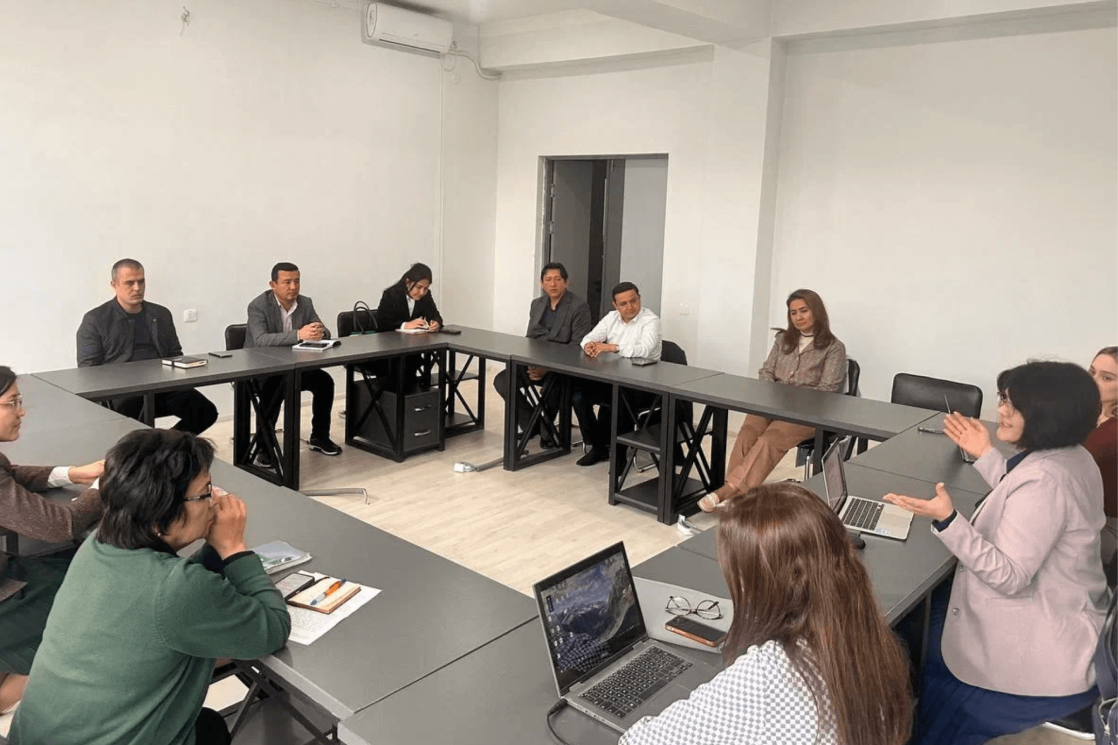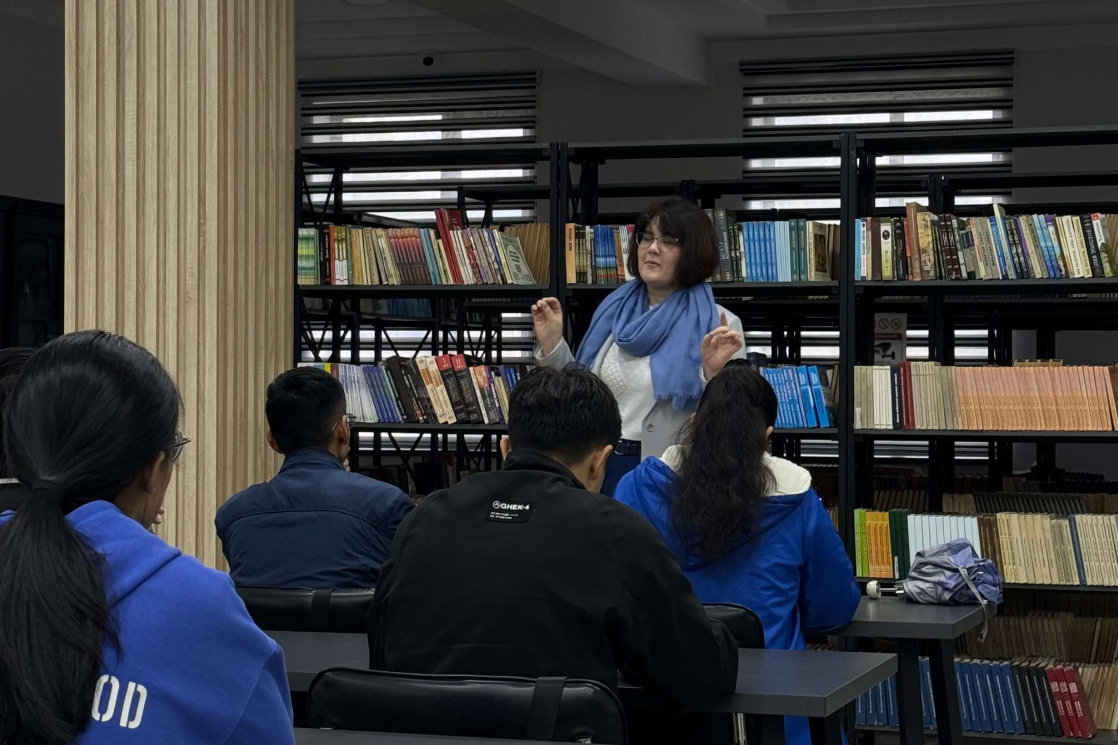Preservation and Promotion of Cultural Heritage: a Perspective from Samarkand and St. Petersburg
Scientists of the Laboratory for Management in Culture and Tourism took part in the scientific-educational seminar «Preservation and Promotion of Cultural Heritage: examples and research methods» held at the Samarkand State University named after Sharof Rashidov. The event was organized within the International academic partnership «Integrated platform solutions for the preservation and promotion of cultural heritage (cases of Samarkand and St. Petersburg)».
The scientific-educational seminar dedicated to the exchange of experiences in studying the cultural heritage of Samarkand and St. Petersburg was held at the Institute of Human Resources and Neighborhood Development Management of Samarkand State University. Samarkand as one of the most renowned points for the Silk Road became an excellent place for discussing current issues related to the research of various formats for preserving and promoting cultural heritage using digital tools.
Laboratory for Management in Culture and Tourism: Senior Researcher
«That’s very symbolic to discuss cultural heritage issues in Samarkand, the city with such rich history. The digital side of the process of preservation and promotion of cultural heritage sites is becoming increasingly important as decisions regarding travel destinations or participation in volunteer projects increasingly depend on how visible and prominent these places or projects are in the digital environment. As part of our project, we are examining how these processes are currently supported by digital tools, which sites remain “invisible”, and what solutions are good and how successful practices may be adapted for other locations, sites and areas».
It is noteworthy that the Laboratory of Cultural Management and Tourism has accumulated significant experience in researching digital methods for culture and tourism. The students working in the Laboratory have prepared several graduation papers also commissioned by organizations in the creative industries sector. The Laboratory successfully integrates modern digital technologies into its research projects,this allows to effectively analyze performance of creative organizations. The combination of digital and sociological methods optimises the data collection process and ensures accurate results. This diversity of methods engages students and young scholars in scientific activities. Thus, the Laboratory not only studies cultural heritage but also develops its potential through educational and practical activities.
A key event of the visit was a discussion «Research Practices in the Preservation and Promotion of Cultural Heritage». The event was attended by undergraduate and graduate students of different programmes, as well as phd students of the Samarkand State University and professors and researchers of the Institute of Human Resources and Neighborhood Development Management. The presentations were dedicated to cultural heritage, its research methods and issues related to its preservation and promotion in the context of digitalization.
One of the most important parts of the two-day seminar was dedicated to various meetings with experts discussing existing practices of cultural heritage preservation, involving specialists in history, geography, economics, information technology and mahalla management. The participants put forward and discussed their theoretical and practical proposals on this topic.

One of the topics presented during the seminar was industrial heritage. The Laboratory for Management in Culture and Tourism conducts a series of studies related to the preservation of industrial heritage sites, their promotion and funding models of their regeneration. Uzbekistan is famous for centuries-old traditions of arts and crafts with artisans passing down their knowledge from generation to generation. In recent years, there has also been a trend reviving long-lost craft traditions. A prime example is the Koni Ghil Meros paper factory visited during the seminar. In the mid-1990s, the production of natural paper was restored, a technology of which had been lost for over three centuries. Such places have already become attractions for tourists. However, if they are combined into a historical and cultural cluster, they could serve as a foundation for the development of industrial tourism.
As part of the seminar, a master class intitled «Using Artificial Intelligence Tools for Working with Scientific Literature» was conducted by Alena Suvorova, project leader of «Integrated platform solutions for the preservation and promotion of cultural heritage (cases of Samarkand and St. Petersburg)».
Laboratory for Management in Culture and Tourism: Senior Researcher
«One of the purposes of our project is to engage students and postgraduates in scientific activities. This involves studying previous experienceand identifying successful and effective research methods. In the early stages of scientific activity, working with literature often seems tedious and unnecessary. And, sometimes literature reviews are conducted only to meet formal requirements. Fortunately, development of AI tools has simplified the routine aspects of this work, allowing researchers to focus on substantive conclusions. During the master class, we discussed some possibilities offered by these tools using examples of tasks relevant to our project. Moreover, we talked about the limitations of AI tools, recommended practices for their use and ethical issues».

As a part of the seminar, a practical-oriented meeting wasalso organized. Participants presented their theoretical and practical proposals, discussed specific aims for the next stage of the project and exchanged opinions which contributed to the expansion ofthe research agenda of the project.

Laboratory for Management in Culture and Tourism: Research Assistant
«Within our meetings we ensured that our colleagues from the Samarkand State Universityare interested in scientific collaboration but also in practical application of the project results. From the beginning of the project, the project involved various cultural organizations in Samarkand All of them expressed interest in developing digitization processes and creating digital platforms for promotion of Uzbekistan's cultural heritage. During our visit, we visited several touristic attractions in Samarkand: both major tourist locations and little-known but significant cultural sites. The cultural heritage of Uzbekistan is very rich but it needsa more systematic approach for its promotion at both national and international levels».
Two-day seminar in Samarkand provided all participants with an opportunity to present their theoretical and practical proposals for the project implementation. As a result of the meeting, the research groups formulated further steps of project activities.


